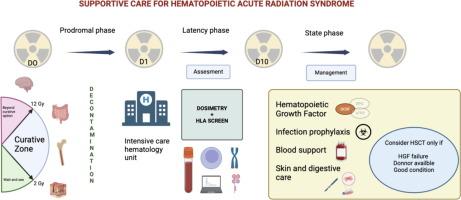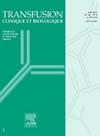急性辐射综合征的处理。
IF 1.4
4区 医学
Q4 HEMATOLOGY
引用次数: 0
摘要
急性辐射综合征包括因暴露于高剂量电离辐射而产生的一系列病理表现。这种综合征通常会经历三个阶段:前驱期、潜伏期和临界期。每个阶段的强度和持续时间因吸收的辐射剂量而异。主要影响骨髓、皮肤和胃肠道,其临床影响深远,必须考虑多器官功能衰竭。辐射剂量低于 2 戈瑞时,一般不会造成严重的临床后果,而超过 12 戈瑞时,辐射剂量就超出了目前的治疗能力。在这一治疗范围内的患者能否存活取决于他们是否有能力承受辐射引起的再生障碍,再加上皮肤、胃肠道和可能合并的辐射损伤导致出血和感染的风险增加。评估辐照程度在制定患者管理策略中起着关键作用,并以临床、生物和物理参数为基础。治疗方法主要包括强化血液学支持以控制症状表现,而病因治疗目前则以生长因子的施用为基础。造血干细胞移植(HSCT)的作用将根据个体情况仔细考虑,尤其是对细胞因子治疗 3 周后仍无反应的患者。本综述重点介绍了急性放射综合征的病理生理机制、评估方法和治疗干预措施,旨在优化患者预后并指导临床实践。本文章由计算机程序翻译,如有差异,请以英文原文为准。

Management of acute radiation syndrome
Acute radiation syndrome encompasses a spectrum of pathological manifestations resulting from exposure to high doses of ionizing radiation. This syndrome typically progresses through three stages with a prodromal phase, a latency phase and a critical phase. Each of them varies in intensity and duration depending on the absorbed dose of radiation. Predominantly affecting the bone marrow, skin, and gastrointestinal tract, its clinical implications are profound and multiorgan failure must be considered. Radiation doses below 2 Gray generally result in insignificant clinical consequences, while exposures surpassing 12 Gray exceeds current therapeutic capacities.
Survival outcomes for patients within this therapeutic range depend on their ability to withstand radiation-induced aplasia, compounded by an increased risk of bleeding and infection due to skin, gastrointestinal, and potentially combined radiation injuries.
Assessing the degree of radiation exposure plays a pivotal role in tailoring patient management strategies and is based on a combination of clinical, biological, and physical parameters. Treatment approaches primarily include intensive hematologic support to manage symptomatic manifestations and etiologic treatment is now based on the administration of growth factors.
The role of hematopoietic stem cell transplant (HSCT) will be carefully considered on an individual basis, especially for patients who do not respond following 3 weeks of cytokine therapy.
This review highlights the pathophysiological mechanisms, assessment modalities, and therapeutic interventions crucial for managing acute radiation syndrome aiming to optimize patient outcomes and guide clinical practice.
求助全文
通过发布文献求助,成功后即可免费获取论文全文。
去求助
来源期刊
CiteScore
2.50
自引率
11.80%
发文量
234
审稿时长
36 days
期刊介绍:
Transfusion Clinique et Biologique, the official journal of the French Society of Blood Transfusion (SFTS):
- an aid to training, at a European level
- the only French journal indexed in the hematology and immunology sections of Current Contents
Transfusion Clinique et Biologique spans fundamental research and everyday practice, with articles coming from both sides. Articles, reviews, case reports, letters to the editor and editorials are published in 4 editions a year, in French or in English, covering all scientific and medical aspects of transfusion: immunology, hematology, infectious diseases, genetics, molecular biology, etc. And finally, a convivial cross-disciplinary section on training and information offers practical updates.
Readership:
"Transfusers" are many and various: anesthetists, biologists, hematologists, and blood-bank, ICU and mobile emergency specialists...

 求助内容:
求助内容: 应助结果提醒方式:
应助结果提醒方式:


